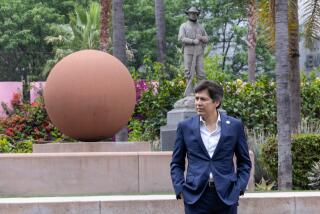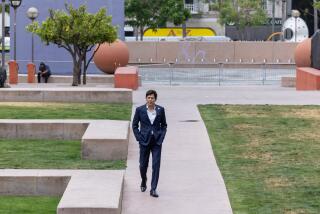M.L. King: Far More Than a Street’s Name
- Share via
The paid solicitors who stand outside grocery stores and shopping centers collecting signatures in support of various ballot initiatives have become so common that a weekend shopping trip seems almost incomplete without them.
As a journalist, I don’t sign these petitions--regardless of their cause--and usually pass by without paying a great deal of attention. But one recent Saturday I was so taken aback by one of these clipboard-wielding fellows that I haven’t been able to get him out of my mind.
The solicitor was a young black man. The initiative he was gathering signatures for would restore the name Market Street to what is now Martin Luther King Way. The irony was not at all subtle.
I resisted the temptation to quiz the man about the seeming incongruity of his pursuit. In hindsight, my reticence probably did him a disservice because I was left to speculate on his motives. I couldn’t help but wonder about his attitude toward Dr. King’s life and work, whether he doubted that his own life had been made better by them. Did he feel that the naming of a street in King’s honor was too much to ask--or perhaps not enough? Did he think that it would have ever become acceptable for a black person to be hired to solicit signatures in an upscale, predominantly white neighborhood had there not been a civil rights movement and a charismatic leader like King? Or, perhaps this was just a job, and the issue didn’t seem important enough to lose the work over.
I thought of the young man again the other night while watching an old news clip of Martin Luther King as part of KPBS’s excellent documentary of the civil rights movement, “Eyes on the Prize.” The setting was a church in Alabama during the first “freedom rides” through the South, a time I remember well from my childhood in Mississippi. It was night, and outside the church an unruly mob of angry Alabamans was prevented by only a thin line of U.S. marshals from storming the sanctuary filled with black civil rights activists.
Inside, the blacks were understandably frightened. But King calmed them by telling them that their first duty was to not panic. It was a tense situation, he acknowledged, but the brave marshals were outside, the State of Alabama had a responsibility to protect them, and, most important, their cause was just and their struggle necessary. It was an example of something we see too rarely these days--real leadership.
Later, I thought that, if every San Diegan had seen that film, there would be no way the Keep Market Street Committee would ever get the necessary 55,000 signatures needed to put the name-change proposal on the ballot, much less win a majority of votes.
I’ll admit I have little sympathy for those who argue on behalf of the “historical significance” of Market Street and not much more for those who complain about the expense of changing the address on checks, letterheads and the like. How does Market Street’s historical significance compare to that of the man who probably influenced the social fabric of this country more than any other since Lincoln? How does the inconvenience that business people are undergoing stack up against the pain and humiliation of being beaten and jailed? How does the price of honoring Martin Luther King measure up against the price he paid? Against the price his widow and children will pay forever?
My own feelings about Dr. King are not academic in nature, and neither are they based on emotion triggered by old news film. When I was growing up as a white southerner in the ‘50s and ‘60s, King was a constant presence on our television set, in our newspapers and in our conversation.
By local standards, my parents were moderates, but unquestionably we lived in a racist environment. I never heard any debate in our community about Martin Luther King. What was there to debate? He was an enemy bent on attacking our “historical” way of life. Everyone felt that way.
I remember billboards along the highways in Mississippi with his picture in a classroom setting and the inscription: “Martin Luther King Jr. in a Communist Training School.” Few of us questioned its accuracy.
As I grew older, my attitudes changed. At first I think I was merely intrigued by the incredible willingness of those in the civil rights movement to defy authority by offering themselves up time and again to be beaten, sprayed with fire hoses, attacked by police dogs and jailed. When three civil rights workers were murdered in Philadelphia, Miss., in 1964, I began to question whether we were supporting the right side. By the time King was killed in 1968, I knew we had not been.
I shudder to think how my life would have been different--what views and values I might have held--had it not been for Martin Luther King. I know I’m a better human being today because of his life. Likewise, my young son will be a better man because of his influence.
If the initiative campaign succeeds in getting the issue placed on the ballot, there is a huge potential for a nasty, divisive campaign. One of the political realities of San Diego is that the black community here is small. On its own, it does not have the clout to defeat the referendum.
Martin Luther King’s special place in the hearts of black San Diegans alone is enough to justify his being honored by the naming of this street. But if those of all races will just think for a few moments about how all our lives were touched by this great man, the effort to turn back time on Martin Luther King Way will fail just as surely as did the efforts of those who tried to block the civil rights movement.
In large measure because of Martin Luther King, blacks and other minorities today have the right to compete with anyone else for educational, social and professional opportunities. They have access to the electoral process, and many have been elected to office. And, whether I or anyone else approves of the issue, they are entitled to solicit signatures on petitions concerning the names of streets.
More to Read
Sign up for Essential California
The most important California stories and recommendations in your inbox every morning.
You may occasionally receive promotional content from the Los Angeles Times.










